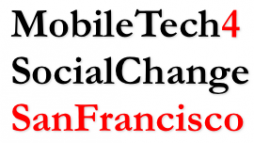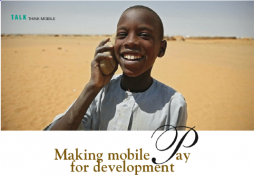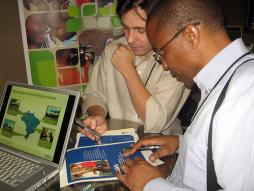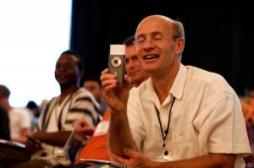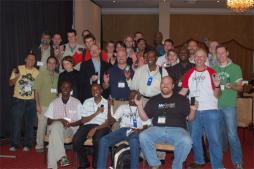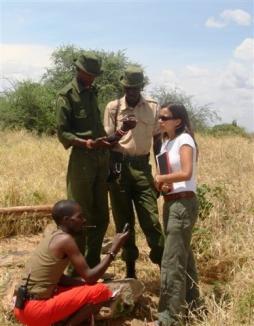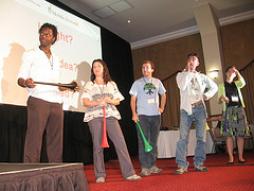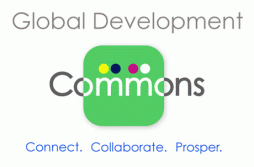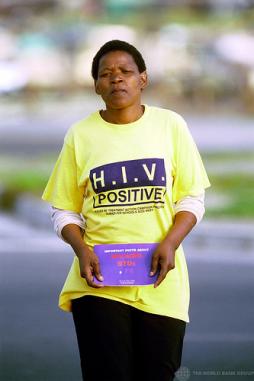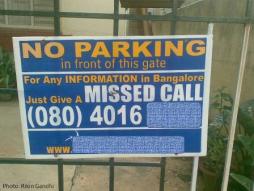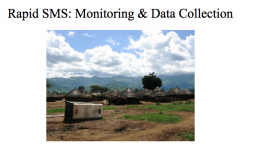Livelihood & Economic Development
Posted by sharakarasic on Nov 01, 2008
On day two of the MobileActive ’08 conference, I attended The Humanitarian Technology Challenge: In Search of Innovative Solutions presented by Claire Thwaites, who heads the technology partnership between Vodaphone and the UN Foundation.
Thwaites said that their goal is to find technology solutions to humanitarian challenges. The IEEE lists five key challenges which Thwaites presented:
Reliable Electricity
Needs: Power availability for electronic devices, including low power stationary facilities, rugged mobile power supplies for emergency settings, mechanical transducers, passive generation devices that charge as you walk. Renewable energy hubs are preferred, as well as the use of intermediate field offices as data relay points.
Data Connectivity of Rural Health District Offices
Needs: Exchange data between central health facilities and remote field offices. Two-way transmission – upload/download, data could be batched for daily transfer, also useful for emergency alerts and outbreak alerts, less expensive service and higher bandwidth needed, maps of existing connectivity
Posted by sharakarasic on Oct 31, 2008
On day two of MobileActive ’08 in Johannesburg, I attended Mobile Use By Micro and Small Enterprises (MSEs) by Jonathan Donner of the Technology for Emerging Markets Group, Microsoft Research India.
Donner explained that Microsoft Research conducts long-term research and development – it’s not tied directly to products. Its goals are to understand potential technology users in developing countries, and to adapt and design technology that contributes to social and economic development of poor communities.
Donners’ research focus was on tiny informal businesses with fewer than five employees. These businesses are post-agriculture and post-family farm. Example types of businesses that Donner examined include basket weaving, fruit stands, food sellers, and informal pipe fittings manufacturing.
Donner studied how mobiles have had a positive impact both in Kigali, Rwanda in 2002-2004, and Bangalore and Hyderabad, India from 2005-2007.
He found “information needs very different than those of my colleagues in Redmond.”
Posted by cmasiello on Oct 29, 2008
Mobile phones bridge the rural digital divide, bring economic benefits, and act as agents of social mobilization through improved communication. But what are the real challenges of reaching rural areas, and what are some of today’s most beneficial applications that can help rural communities, specifically regarding agriculture development?
The Virtual Forum on "Mobile Telephony in Rural Areas" will examine the challenges that rural communities face in enhancing the benefits of mobile telephony, and look at some examples of interesting initiatives and good outcomes from around the globe.
Subject Matter experts include:
Posted by KatrinVerclas on Oct 28, 2008
We are very privileged to co-host MobileTech for Social Change, a barcamp on 4 November 2008 in San Franciso from 10 am - 2 pm. We are especially pleased to co-organize the event with Dan Appelquist from Mobile2.0, Mobile Monday UK, and Vodacom. Registration is here!
Fresh back from MobileActive08, we'll explore mobile tech to advance social development and social change goals. Expect this to be highly participatory and interactive, and cover anything you wanted to know about using mobiles for social change. MobileTech for Social Change is open to anyone with passion and interest in the topic and since it's a barcamp, bring your ideas, innovations, products, tools, projects, and organizations!
And if you want to be an angel and sponsor the event, contact us at info at mobileactive dot org! Registration again: Go here!
Posted by sharakarasic on Oct 28, 2008
On the first day of MobileActive ’08 in Johannesburg, I attended "M-Banking and M-Payments for Social Impact", with Jonathan Donner, Tonny Omwansa, Jesse Moore, Brian Richardson, and Alex Comninos presenting to a packed room. The session gave an overview of m-banking (mobile banking) and m-payments (mobile payments), including specific mobile banking solutions such as M-PESA and Wizzit.
Brian Richardson, the CEO of Wizzit, began by stressing that mobile banking is becoming more and more common in African countries. In South Africa, more than 11 million people live with cash only. 600 million in Africa don’t have access to basic financial services because of affordability, accessibility, and availability. Without access to basic financial services, it’s hard to be an economic citizen.
Posted by KatrinVerclas on Oct 25, 2008
This article, in a slightly revised version, was published by Orascom's TALK Magazine, Fall 2008.
There has been much talk of late about mobile financial services as a way to lift millions of people worldwide out of poverty. A recent article in The Guardian called mobile banking in developing countries “potentially revolutionary.” The advent of mobile financial services promises to bring many more poor people into an economic mainstream where safer and less costly financial services (such as person-to-person payments and remittances) are delivered over the cell phone. But is this promise anywhere near reality?
Transferring money via mobile phones can save days of travel for workers in cities who send money home to families in rural villages. Mobile payments are also often cheaper and more secure than relying on informal brokers or carrying cash personally, and they have the potential to change markets by making small business-to-business transactions immediate and more reliable.
Posted by KatrinVerclas on Oct 24, 2008
Three hundred and eighty people gathered from all over the world in Johannesburg last week to discuss how mobile phones might be used for social and political purposes in developing countries. The event crackled with the kind of energy that happens when people gather on a topic for the first time. Russell Southwood, a prominent researcher and analyst in South Africa, looks at the issues raised by the event. Excerpts follow.
At the core of all this energy was a very simple notion. The technology device of choice for the majority of people in developing continents like Africa is the mobile phone. If you want to deliver messages to people or get them to respond then SMS or voice is an obvious route to go down.
Posted by KatrinVerclas on Oct 19, 2008
Two great blog-posts wrap up MobileActive08. Ismail Dhorat from ignite^2 gives an overview of one of the best sessions on ReadWriteWeb:
I found this presentation by Tino Kruetzer, a researcher at the University of Cape Town, extremely interesting. It was based on the interim results of a pilot study on mobile internet usage by low income youth in Cape Town. Some of the key findings were:
Posted by sharakarasic on Oct 15, 2008
Here are some of the main actions people would like to take as a result of collaboration and learnings at MobileActive '08.
1. Mobile Bill of Rights
2. Open Source Consortium
3. Global Mapping Project for Global SMS Interoperability
4. Enhanced Mobile Project/Vendor/Tool Directory
5. Communicability Strategy Research Group
6. More sharing and collaboration on social mobile projects
7. Mobile web wiki
8. OpenContent - especially HIV content including content, terminology, translation.
9. Group formed to collect cross-country comparisons of interventions using mobile technology
10. Group for agriculture and mobile technology
Posted by sharakarasic on Oct 15, 2008
Reposted from www.mobileactive08.org
According to Microsoft’s Unlimited Potential division, there are several barriers standing in the way of effectively reaching the large masses of underserved communities. Among these are infrastructural obstacles, localization issues, the need for personalized solutions, and the prohibitive cost of technology.
As a solution to these problems they are looking at ways of tapping into the most basic a ubiquitous form of technology on the continent: mobile phones. This would enable users of mobile phones to access services from Microsoft’s services in the ether to mobile phones through pcs. To this end, there has been a lot of research into bringing the Microsoft platform to basic mobile phones by providing the technology to do this as well as by partnering with service providers as well as governmental and non-governmental actors.
Posted by ehersman on Oct 15, 2008
One of the big initiatives that was just formed/announced at MobileActive '08 was what we're calling the "Open Mobile Consortium" (working name). This is a body much like the W3C, focused on bringing together groups working on initiatives in this space, formulating best practices and standards and generally working to bring this fragmented industry a little closer together.
We'll see where this goes, but there seems to be a lot of enthusiasm and willingness to make something happen. On top of that, the organizations taking part carry a lot of weight. There were representatives from UNICEF, Shuttleworth Foundation, Tactical Tech, InSTEDD, Cell-Life, Ushahidi, UN Foundation, Open Rosa, Columbia University, and many more that I can't remember.
Posted by webb on Oct 15, 2008
As Katrin Verclas posted last week, the 2008 USAID Development 2.0 has launched. The challenge is seeking innovative mobile technology projects.
Hosted on the NetSquared community site, you are invited to submitt your project idea to a community process:
- You will have an opportunity to submit your idea and receive feedback from NetSquared's 13,000 members.
- When the submission period ends, registered NetSquared users can partiicpate in an on-line vote to select 15 featured projects.
- Senior USAID staff will select a first place and two runners up. The first place winner will receive a grant of $10,000, with runners up receiving grants of $5,000 each. All three will have an opportunity to present their ideas to senior officials and the public.
To find out more about the challenge and, we hope, enter your idea, please visit: 2008 USAID Development 2.0 has launched. We look forward to seeing what you are working on.
Posted by sharakarasic on Oct 14, 2008
I spoke with Ian Puttergill of Microsoft Digital Divide Solutions. They are working on taking the power of web and data capabilities and extending that to mobiles. He demonstrated an SMS hookup to Excel based on SMS Toolkit that can be used for data collection and analysis in rural areas. In Kampala, Uganda they consulted with midwives to design a system that would find out what equipment, training, and medication local populations needed. They are currently still working on that system and its feasability - it's not yet in the field.
Posted by sharakarasic on Oct 14, 2008
Mobile researcher Andi Friedman just presented the results of his survey of the MobileActive '08 attendees. He showed us a Google map mashup using the dialing code of attendees to show where they come from, and there are people here from every continent but Antarctica. South Africa heads the list and Zimbabwe is in second place.
Other facts: 65% of attendees are NGO's, if attendees had $1 million to spend on a mobile application for social change the top sectors they'd choose to bulid it for are education and health, with government in last place.
Unsurprisingly, 0% of attendees don't own a mobile.
Posted by KatrinVerclas on Oct 13, 2008
Reposted from MobileActive08.org, by Brett Davidson
This afternoon I attended 'The Mobile Web': The potential and reality for developing countries, facilitated by Toni Eliasz.
There was extended discussion of the value of the mobile web to developing countries. Views hinge a lot on how one defines 'mobile web'. Some people had strong reservations about the potential of the mobile web, related to affordability, the need for high-end phones in order to browse the internet, the high cost of data access via cellphone networks, and ongoing problems with connectivity.
But many of these reservations can be removed if one defines the mobile web more broadly than accessing the Internet. One person proposed defining it as access to data and databases in whatever form. So if people are able to access data on the Internet, through tailored SMS services, for example, that qualifies as the mobile web.
Posted by KatrinVerclas on Oct 13, 2008
MobileActive08 delved right into the key issues that we have been talking about for some time now. During the Mobile Cafe in the opening session, key themese emerged that need to be addressed to fully "unlock the potential of mobile tech for social change."
It was rightly noted that we need to make "common ground" - there are lots of small projects that should start sharing notes, tech, and experiences. This is one of the key reasons, of course, why we co-convened MobileActive08 - to bring the best and the birghtest people in this field together to start comparing notes. Several participants talked about the importance of voice. Much attention is focused on SMS and higher-end applications but voice is often neglected.
The cost of mobile communication is a hug barrier for many projects that needs to be addressed in order to go beyond a small proof-of-concept phase to anything resembling sustainable use of mobiles.
Posted by MartinLucas on Oct 13, 2008
Greenpeace Argentina, Al Jazeera, Unicef, Burmese monks, healthcare workers in ten African countries, geeks and IT entrepreneurs, 380 people from 45 countries: what's the common link? Mobile technology with a social mission. Whether it's sharing medical information in rural Mozambique, or helping getting the word out about post-election violence in Kenya or getting accurate demographic data in regions with no IT structure, or using phone minutes for micro-banking or social marketing, someone here (and there are close 400 participants) is talking about it, and others are sharing their experiences, with each other of course, and with any social network you've heard of from Twitter to Flickr to Youtube to Facebook.
In general the flash of the IT world is mixed with a fair amount of humility; most people are here as much to listen, and get the lay of the land as they are to present the killer app or networking tool.
For me, coming from New York, the notion that Katrin Verclas suggested, that the event is packed with people and information precisely because it's in Africa, rings true.
Posted by KatrinVerclas on Oct 13, 2008
As more than 300 mobile social innovators set out to Johannesburg to convene at MobileActive08, we wanted to let you know how you can follow the proceedings and participate remotely. We will be blogging many of the amazing sessions here on this blog, on MobileActive08's blog; and you can follow and discuss proceedings through these channels:
Posted by KatrinVerclas on Oct 09, 2008
There is yet another competition focused on mobile app development, this time sponsored by USAID and Netsquared. Starting on October 13, Development 2.0 will reward the innovative uses of mobile technologies for international development withup to $10,000 for the winner. While this is less than some of the other recent competitions, applicants can get advice and improve their ideas and clarify their project submissions during the entire application process on a project gallery.
A open voting process will determine the best projects, and then a jury of USAID senior staff will select the final winners. More info is here.
Other compeitions open right now:
Knight News Challenge -- $5 million awarded to digital media projects, including mobile citizen media projects;
Posted by KatrinVerclas on Oct 09, 2008
Brough Turner is a renowned telcom industry professional with a passion for mobile and a very smart guy. We recently interviewed him about the mobile web for a paper on cell phones in citizen media. What he said is useful for thinking about this in the context for social benefit, so we post it here for you, before the release of our report. We will also have a workshop on the role of the mobile web for social development at MobileActive08.
You asked me to elaborate on today's mobile web and how it will change with the advent of 3G networks. Here we go: Mobile phone networks provide the best telephony coverage in the world and, for more than a decade, mobile operators have had a "data" story. Unfortunately, the data side of mobile telephony has been slow, expensive and limited in what it can access.
Posted by KatrinVerclas on Oct 07, 2008
How are social movements in the global South taking advantage of the ubiquity of mobile phones? Melissa Loudon, a researcher now working at the University of Capetown, looked at how the South African Treatment Action Campaign (TAC) is using mobiles in their work to advocate for a comprehensive HIV/AIDS policy in South Afric, and wrote this article based on her research.
Kevin Gillan, a researcher on the British anti-war movement, describes social movements as “definitionally collective and communicative”. Co-ordination of protest action, mobilisation of financial resources and strategic interaction would be almost unthinkable without information and communication technologies (ICTs). Although the importance of mass media to social movements has long been recognised, new ICTs burst on the scene in 1999 when demonstrators in the 'Battle of Seattle' orchestrated unprecedented protest action using mobile phones, email and the Internet. Ever since, ICTs have been accepted as an integral part of mobilisation in the North.
Posted by KatrinVerclas on Oct 04, 2008
This article was written by Lisa Campbell of the Youth Action Network and is reprinted here with permission. Lisa's research and articles are on her blog Mobile Revolutions.
Globally 1.5 billion people have access to televisions, and 1 billion to the Internet; yet overall the most actively used electronic gadget is the mobile phone, with over 3 billion users worldwide. Reaching the 4 billion mark before the end of 2008, that equals to approximately one cell phone for every two human beings. Under 30-years in existence, cell phones are one of the most rapid developing technology the world has ever known. According to Touré, Secretary General of the ITU, “The fact that 4 billion subscribers have been registered worldwide indicates that it is technically feasible to connect the world to the benefits of ICT and that it is a viable business opportunity.” According to Touré, “Clearly, ICTs have the potential to act as catalysts to achieve the 2015 targets of the MDGs.”
Mobile phones are the first telecommunications technology to be more popular in developing nations, than their developed counterparts, far outnumbering internet coverage (Zuckerman 2007). More and more people are using their phones to access the internet instead of computers. Soon there will be more cell phone users than literate people on the planet. This signifies a shift into a new age of digital literacy, where avatars, emoticons, pictures, sounds and videos often hold more power than names and numbers.
Economists around the world are hailing cell phones as the solution for ICT development and a ray of hope in bridging the digital divide.
Posted by fredericknoronha on Oct 02, 2008
Jonathan Donner has been studying mobile phone use in the developing countries for several years. We have written previously about his fascinating work on the phenomenon of missed-calls as a way of communicating.
Jonathan is a researcher in the Technology for Emerging Markets Group at Microsoft Research India in Bangalore and an astute social scientist. At MobileActive08, Donner will be speaking in a panel where participants will brainstorm innovations in social mobile marketing.
Posted by KatrinVerclas on Sep 29, 2008
In our occasional mobile tool reviews, we are featuring this week two reviews of similar mobile applications that provide bulk messaging focused on NGO needs. Today's review is of RapidSMS, an open source enterprise level bulk messaging application developed by UNICEF. Later this week we'll be reviewing FrontlineSMS, the much-touted grassroots bulk messaging desktop application.
Matt Berg from the Millennium Villages Project will feature RapidSMS at MobileActive08. He has, as part of his work, tested RapidSMS extensively and has written this review for us.
The upshot:
